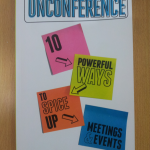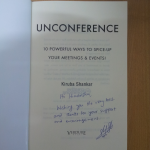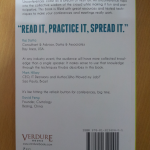There have been many articles on this blog about Unconference(s) but just like it, there is information scattered on the topic across the internet. There couldn’t have been anyone better than Kiruba Shankar to write a book on Unconference. Before I start the book review, let’s see what exactly is an Unconference:
An unconference is a facilitated, participant-driven conference centered on a theme or purpose. The term “unconference” has been applied, or self-applied, to a wide range of gatherings that try to avoid one or more aspects of a conventional conference etc. [Source : Wikipedia]
To keep it simple, An “Unconference” is a gathering where every attendee is a speaker & it is a conference of the attendee, by the attendee & for the attendee.
About the Author
Kiruba was one of the organizer’s of BlogCamp, Chennai [the first Blog Unconference in India] that was held in 2006 & under the non-profit organization “The Knowledge Foundation”; he & his team have organized many successful unconference’s namely BarCampChennai, BlogCamp, Proto.in, SearchCamp, WikiCamp, FailCamp & many more…
Detailed Review
The book starts with the basic topic of “Introduction to unconference” given that many of the readers might not be familiar with the concept of Unconference itself !!! The concept is very well explained along with the origin of Unconference [excerpts from the book below]
As stated by Dave Winer – “The sum of expertise of people in the audience is greater than the sum of expertise of people on stage” and called Fundamental Law of Conventional Conferences. If a random group of people were picked from the audience & were put together to discuss the same issue of the conference, it is likely that there is greater energy, enthusiasm & learning. Thus, the idea of unconference’s was born.
For many, it might seem that unconference is similar to “Conference with MORE Freedom” hence the author has explained the “Differences between conferences & unconferences“. Some excerpts from the topic below:
The best time in a conference is during coffee breaks. Unconference is like one big coffee break. Great conversations are definitely expected in unconferences !!!
Rest of the book dives into different methodologies to spice up the meetings & gives details into how “Boring” meetings/conferences can be transformed into “Interesting & Interactive” unconferences. These topics help the reader to organize meetings [with smaller i.e. < 5 members as well larger audience i.e. 50+ more] in a more intuitive way so that every person in the audience takes something back from the meeting !!! Some excerpts from the book on these methodologies below [PS: Every chapter on these topics are sub-divided into a) Uniqueness of the methodology. b) How to organize it. c) Case-Study]:
Open Space Technology
Open Space runs on two fundamentals: Passion & Responsibility. Passion engages people in the room. Responsibility ensures that things get done.
– Harrison Owen, Creator of Open Space Technology.
Four principles of Open Space Technology:
- Whoever comes are the right people.
- Whatever happens is the only thing that could have happened.
- When it starts is the right time.
- When it’s over, it’s over.
Appreciative Inquiry
Appreciative Inquiry leverages the most positive possibilities by involving all the voices in the community.
– Bliss Browne, Founder – Imagine Chicago
It focues on what is possible rather than what is not. It starts with the belief that every organization & every person in that organization has positive aspects that can be built open. It is one of the best methods to build an “OPEN” company culture !!!




